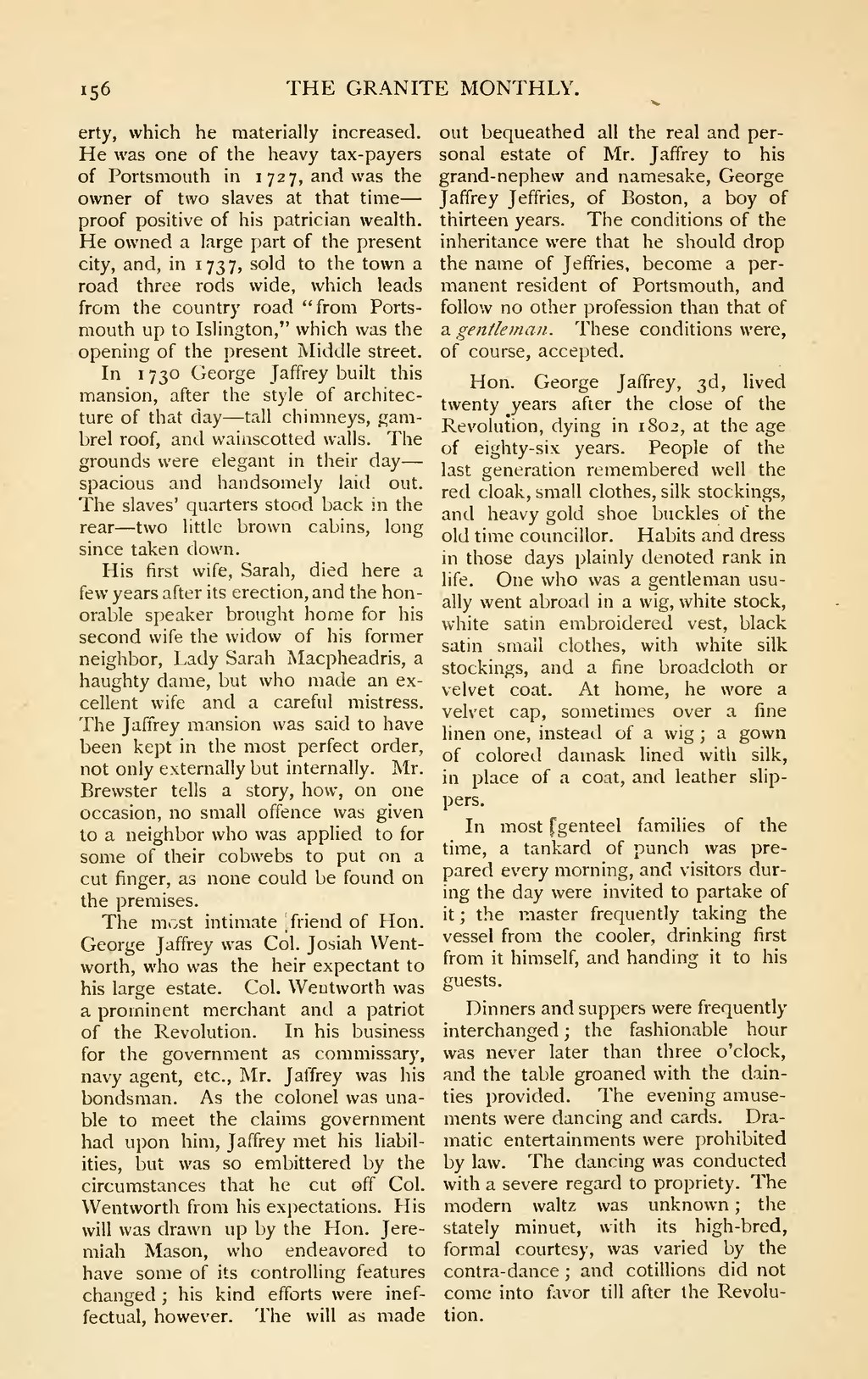156
��THE GRANITE MONTHLY.
��erty, which he materially increased. He was one of the heavy tax-payers of Portsmouth in 1727, and was the owner of two slaves at that time — proof positive of his patrician wealth. He owned a large part of the present city, and, in 1737, sold to the town a road three rods wide, which leads from the country road "from Ports- mouth up to Islington," which was the opening of the present Middle street.
In 1730 George Jaffrey built this mansion, after the style of architec- ture of that day — tall chimneys, gam- brel roof, and wainscotted walls. The grounds were elegant in their day — spacious and handsomely laid out. The slaves' quarters stood back in the rear — two little brown cabins, long since taken down.
His first wife, Sarah, died here a few years after its erection, and the hon- orable speaker brought home for his second wife the widow of his former neighbor, Lady Sarah Macpheadris, a haughty dame, but who made an ex- cellent wife and a careful mistress. The Jaffrey mansion was said to have been kept in the most perfect order, not only externally but internally. Mr. Brewster tells a story, how, on one occasion, no small offence was given to a neighbor who was applied to for some of their cobwebs to put on a cut finger, as none could be found on the premises.
The most intimate 'friend of Hon. George Jaffrey was Col. Josiah Went- worth, who was the heir expectant to his large estate. Col. Wentworth was a prominent merchant and a patriot of the Revolution. In his business for the government as commissary, navy agent, etc., Mr. Jaffrey was his bondsman. As the colonel was una- ble to meet the claims government had upon him, Jaffrey met his liabil- ities, but was so embittered by the circumstances that he cut off Col. Wentworth from his expectations. His will was drawn up by the Hon. Jere- miah Mason, who endeavored to have some of its controlling features changed ; his kind efforts were inef- fectual, however. The will as made
��out bequeathed all the real and per- sonal estate of Mr. Jaffrey to his grand-nephew and namesake, George Jaffrey Jeffries, of Boston, a boy of thirteen years. The conditions of the inheritance were that he should drop the name of Jeffries, become a per- manent resident of Portsmouth, and follow no other profession than that of ■Si gentleman. These conditions were, of course, accepted.
Hon. George Jaffrey, 3d, lived twenty years after the close of the Revolution, dying in 1802, at the age of eighty-six years. People of the last generation remembered well the red cloak, small clothes, silk stockings, and heavy gold shoe buckles of the old time councillor. Habits and dress in those days plainly denoted rank in life. One who was a gentleman usu- ally went abroad in a wig, white stock, white satin embroidered vest, black satin small clothes, with white silk stockings, and a fine broadcloth or velvet coat. At home, he wore a velvet cap, sometimes over a fine linen one, instead of a wig ; a gown of colored damask lined with silk, in place of a coat, and leather slip- pers.
In most fgenteel families of the time, a tankard of punch was pre- pared every morning, and visitors dur- ing the day were invited to partake of it ; the master frequently taking the vessel from the cooler, drinking first from it himself, and handing it to his guests.
Dinners and suppers were frequently interchanged ; the fashionable hour was never later than three o'clock, and the table groaned with the dain- ties provided. The evening amuse- ments were dancing and cards. Dra- matic entertainments were prohibited by law. The dancing was conducted with a severe regard to propriety. The modern waltz was unknown ; the stately minuet, with its high-bred, formal courtesy, was varied by the contra-dance ; and cotillions did not come into tav^or till after the Revolu- tion.
�� �
